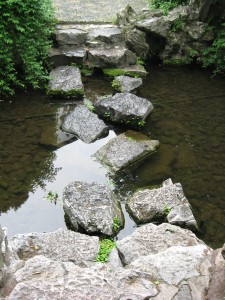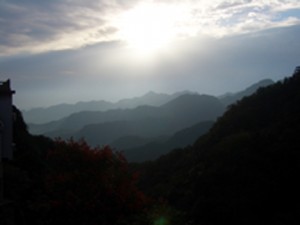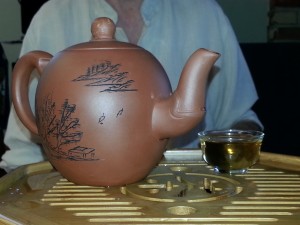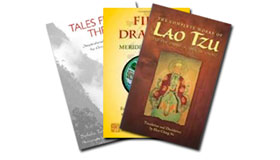My but time doth fly by these days!
My good news is that I just sold my new book on using the Tao Te Ching as a manual for self-cultivation to Sounds True, a great publisher! It will be out in the Spring of 2016. (Books, like people, take a long gestation period.)
Here’s a small taste of what will be included:
Step 52
All beings under heaven have an origin
which is the Mother of all things.
To know the Mother is to know her children.
To know her children
yet to be connected with the Mother
is to live to the end of one’s life without harm.
Shut your mouth and close the door of your senses
and you will live long with no troubles.
If you keep interacting with the world,
seeking to control the world,
and leaving the sense gates open
there will be no redemption.
Perceiving the small is called illumination.
Preserving the soft and yielding is called strength.
Use the light to return to inner light.
You will not invite disaster
and will enter the eternal.
THE COMMENTARY
Here again we see the image of Dao as the Mother of all things. To know or understand the source, the Mother, we need to know her children, us. To really know and understand ourselves is to be connected to this cosmic source. Not only that but to experience our deep connection to this source is to live to the end of our days without harm. It is when we experience ourselves to be deeply connected to our source that we are able to dance with the winds of change and flow with the challenges and opportunities life has to offer.
Next we are given instruction on deep meditation or stillness practice. Closing our mouth and shutting the door of our senses is to go into deep meditation. In this way we can live a long life with less troubles than the person whose sense doors are constantly open and being overwhelmed by the ways of the world. The person who never spends quiet time going within ends up being a victim of his or her projections, fantasies and perceived threats and wrongs done them by the outside world. By seeking to control the world outside of themselves they become cut off from the real world within and lose that all-important connection to the Mother.
It is often in the small moments of life that we are able take the time to really understand who and what we are. Life is made up not of one grand adventure after another, but by each uninteresting moment. To understand and cherish this is called illumination (lit from within).
We all have personal cycles. Sometimes we’re up, other times we’re down. Of course, we enjoy our high cycles much more than our low ones. But we often learn much more from our low cycles. By honoring them and paying close attention to what they have to teach us we can become wise.
The next line reminds us that what the world perceives as soft and yielding is actually a form of strength. This is not the strength of yang, which is easy to see but the strength of yin. Not as easy to see with our outer eyes perhaps but, in the long run, will last much longer than the fiery, easily burned out yang.
The last lines refer to the practice of “turning the light around.” The practice of turning the light around has much to do with turning the light of attention or consciousness onto the original mind or consciousness. In this in turning the light around or allowing the light to penetrate into the dark recesses of our mind, that we can allow our true, essential self or Dao nature, to emerge. Once we no longer identify solely with our own intellectual and energetic constructs we can more easily differentiate what is real from what is false, what is eternal from what is passing.
The more deeply the practitioner is able to let go of the attachments of the mind, the more assistance, at both a spiritual and energetic level, comes his way. Effort as a product of the mind interferes with the free flow of abundant living. Dropping out of the effortful mind, giving up an effortful way of living, allows that which was blocking the natural flow of abundance to disperse. The Daoists call this the ming shen, the radiant mind or spirit.
THE PRACTICE
The practice of turning the light around is the subject of a famous Daoist work called The Secret of the Golden Flower (Taiyi Jinhua Zongzhi), written by the famous Daoist immortal Lu Dong Bin. This text gives us instructions on how to gather and refine our original spirit. Here the image of gold is used to represent the light of the original spirit with the flower representing the awakening or blossoming of that spirit.
Turning the light around refers to the practice of turning our attention inward so that we can arrive at the original mind, or what the Buddhists call “original face.’ This is also called “the mind within the mind.” How do we do this?
Thomas Cleary, in his masterful translation of this text, says:
In general, what is most essential at the beginning of this study is self-refinement. Self-refinement is a matter of mind and breathing resting on each other. This means that the mind rests on the breathing and the breathing rests on the mind. [1]
What this means is that we use the breath to calm the mind down and we use the mind to follow the breath. As in our other meditation practices we allow our breath to become very slow, very deep and very quiet. We allow our breath to become so natural and unforced that it is as if we are not consciously breathing anymore but are “being breathed.”
And as we allow our breath to move in this way our mind also becomes quieter, less active and slows down. Our mind is all to often running madly around in circles. This is what the Buddhists call the “monkey mind” and the Daoists call “the wild horse.” It is not necessary to kill the horse, we only want to tame it. Some people think that we need to stop thoughts altogether but this is not only a very advanced practice, but is in actuality just about impossible. No matter, the more we can quiet our mind the quieter our spirit (shen) will become.
Sit on a cushion or on the edge of a chair. It is important to keep your body erect, without being stiff. Imagine there is a thread coming from your baihui (top of head) up to the heavens that gently holds your head up. Place the tip of your tongue on the roof of your mouth and breath slowly and deeply into your lower dantian. Either close your eyes completely or leave them open just a little, focusing on the tip of your nose. If you eyes are closed just look straight ahead.
Allow your thoughts to gently slow down until you can keep one thought. There is an old saying about how to enter this tranquil state. “Substitute ten thousand thoughts with one.” This means instead of letting the wild horse run all over your consciousness gently guide him onto one path only and keep him there. He will want to run all over the place but keep guiding him along the one path. One of the ways to do this is to focus on the breath. You can count up to ten or even higher, though it is better not to go above thirty six. (One inhale and one exhale counts as one breath.)
Now turn your sight inward, focusing your attention on your lower dantian. Put all your attention on your inner self and let go of your outer self. The outer world is such a distraction that for most people, even when they are meditating, it has a strong hold on them. Now is the time to let all of that go. Turn your gaze away from the world in into your deep inner self. This practice is to connect you with your original spirit, or as the Zen teachers say, “the face you had before you were born.” This practice is also called “inward gazing.”
Thomas Cleary says:
The conscious spirit is a complex of modifications of awareness, while the original spirit is the essence of awareness. [2]
By practicing in this way we reach the level of what the Daoists call ‘living midnight,’ a state of profound mental stillness and quietude, which allows the original or celestial spirit to come forth. It is a way to get in touch with the source of our awareness rather than just the outer manifestations of it.
With practice you will be able to understand better where your mental constructs are coming from and how to dismantle them when they are no longer needed. You may also experience things like warmth or tingling in your dantian or even things like lights and sometimes even sounds. Of course we are always taught not to get too excited about these things or at least not cling to them. For many people there are no special effects, just a feeling of deep quietude, where the outer mind slows down or even recedes and the inner light of true awareness is able to shine forth, resulting in deep relaxation, trust in your own spiritual processes and a deep awareness of your connection to source, to Dao.
It is also good to have a positive and relaxed attitude towards your meditation. Hua-Ching Ni tells us:
If your attitude toward meditation is too tight and you sit solemnly and stiffly, you will nourish and increase this overly serious and unpleasant aspect of your practice and this will become the sour fruit you bear. If, on the other hand, you sit with genuine joy, the world sings to you; the pores and cells of the breeze dance for you. [3]
End this practice as before, with rubbing your hands together thirty six times and then rubbing up and down your face. It is also a good idea to sit for a few moments to gather yourself before entering back into the outer world of ‘doing’ after spending time with ‘being.’ Don’t just jump back into your day but enter it slowly. You may also be a bit sensitive at first so it is best not to enter into any kind of emotionally disturbing communications right away.
The wise one who preserves peace
in his inner self
encounters no dangers on his way.
He can fight in a battle
and not be harmed by weapons.
He has nowhere for the rhinoceros
to stick his horn.
Tigers can find nowhere
to use their claws.
No weapon can harm him.
Why is this?
Because he has no place
for death to enter.
Daode Jing Chapter 50
Affirmation:
If I am able to find
true peace within myself
I will encounter no challenges
I cannot deal with.
I can encounter these challenges
with no harm to myself.
Because of this
there are no challenges
that can truly harm me.
Why is this?
Because I have no place within me
for defeat to enter.
Commentary: If we are truly able to live our lives full of inner peace we will not attract disruptive energy and experiences. And if we do, we can gracefully dance with them, like performing a kind of emotional taiji (tai chi) and either deflect the energy or deflate it.
It is because we are truly peaceful inside that we have the inner confidence and strength to deal with the challenges of life and, instead of being defeated by them, become wiser and larger, more expansive beings instead.
Allowing myself to become empty
I abide in stillness.
The things of this world come and go
as I watch,
powerful within my own being.
Whatever ends comes round back again.
I watch this in a tranquil
and peaceful state.
I allow myself to return
To my original nature.
In doing so I connect myself
with what can be called “constant renewal.”
To truly understand this process
can be seen as “illumination.”
To not understand that
things come and things go
invites disaster.
Commentary: It is in abiding in stillness that we can remain detached from the up’s and down’s of life. By remaining close to our own natural, peaceful nature we can deal with life’s challenges without losing our center. All life is change, say the masters of Dao. One day we’re up, the next we’re down. One day everything we lay our hand to blossoms, another day we can do nothing right. The only constant is change. By remembering this we can find our way to flow with the changes instead of fighting them.
We can also think of it as “constant renewal.” Things, money, friends, lovers, experiences, all come and go. It is only our own inner core, our “original nature” that does not change. By always identifying with this we can better understand and even dance with the challenges life offers us.
Everything is cyclical, and in every cycle there comes a point where things turn around. Great adversity was once overwhelming; now it starts to wane. Those who remain centered will go through bad times and eventually receive good fortune.
Hua Ching Ni
There was once a rich man from the country of Chou. He had a huge estate and many workers, who he drove unmercifully. Day after day they toiled under the hot sun to fill the coffers of the rich man.
One of these was an old man who had been working for the rich man’s family for many years. His body was nearly worn out with hard work and little rest; his muscles were stringy and his breath came in gasps, but still the foreman drove him on. At the end of the day, however, once he had laid his weary head down on his rice bag pillow, he dreamed he was a rich man with a huge estate. All night long he was waited upon by servants, fed rare delicacies and entertained by beautiful women who played lovely and haunting melodies and danced ancient and graceful dances for him. He spent the entire dream in idle pursuit, dandling his fat young sons on his knees and laughing into the night.
Of course, upon waking, the old man was once again the lowly laborer who spent his day in endless toil. When the noonday break came and he sat heavily down to eat his rice, his face showed his weariness. His friends would then try to console him. “No need,” he would say. “By day I am a slave to the rich man but at night I am the rich man. I spend half my life working his fields but the other half I spend in ease and comfort. Therefore do not pity me.”
On the other hand, when the rich man, who spent his days in useless frivolity, laid his head upon his silken pillow, he tossed and turned and groaned all through the night. He dreamed he was a common laborer in his fields. All through the dream he worked, bent over, with muscles aching and sweat pouring down his face. For his noon meal he ate the coarsest rice with no flavor and, instead of sweet wine, he drank brackish water, not even tea. At the end of his labors he collapsed on his pallet, all alone in his little hut—his wife had died long ago and his children had left to find a better master far away. His life meant unending toil, with no rest and no respite, for his master was cruel and demanding. This life was truly miserable.
When he awoke in the morning the rich man’s muscles ached as if he had worked in the fields all night, his bed was soaked with sweat and his mouth tasted dry and dusty.
When he complained to his friends they told him, “Don’t worry. By night you may suffer but by day you are a rich man, well respected in the business community, and you have far more than you will ever need. You are at the top of the ladder; that is why you dream at night that you are at the bottom. You cannot have it both ways. Things must balance. That is why you have those vexing dreams.”
The rich man thought about this, as each day he awakened more weary than the day before. He took to walking over his estate to try to relax his agitated mind. He saw his workers there, toiling in the hot sun all day. He noticed in particular one old man who never stopped working, who was shriveled and bent over by many years of hard labor. Yet he never complained, never shirked, and always had a small smile on his face. “I envy that man,” he thought. “He has nothing yet seems so much happier than me.”
The old worker saw the rich man watching him. He noticed how the rich man looked drawn and tired. His skin was pasty and drooped from his face in an unhealthy way. He noticed that the hands of the rich man, as soft and manicured as they were, shook and that his soft, fat body looked weak and tremulous
After a time, the rich man decided it would be better if he changed his ways, since he was not happy with the way things were going. He lightened up on his workers, gave them more time off and began himself to be more physical, which after a time, made him feel immeasurably better. Not only that, but his nightmares went away and he slept more soundly than he had in years.
As for the old man, he too began to enjoy his waking life more and did not need to escape each night into dreams. Instead he too slept soundly. As the Ancient Sage says: “The Realized People of old forgot themselves when awake and did not dream when they slept.”
Liezhi (from Tales of the Tao by Solala Towler)
Drinking tea with Tao is about letting go of all our “stuff” and just being ourselves
as we really our, in our true nature.
Aaron Fisher (Wu De)
We talk a lot about the lower dantian in qigong training. Actually we use it also in meditation and nei dan (internal alchemy) practice as well. The lower dantian, while the first (if you count from the bottom) of three dantians, it is considered the foundation level. As in building a house, we have to start at the bottom, rather than at the top. Many people, on first learning meditation, want to start at the top and begin working with the upper dentian or third eye center and often get themselves into energetic trouble. To the Daoists, it is very important that one builds a foundation before beginning such practices. It’s like attempting to put the roof on before building the foundation. The center will not hold.
Of course middle dantian or heart center practice is very important. As a matter of fact, this is the center that women are often told to begin with. In Daoist tradition, woman are seen as not only energetically superior to men but are also spiritually superior as well. This is, of course, a generalization but many women have a much easier time opening their hearts to Source than many men do.
In any case, beginning with the lower dantian is always a good way to go. The lower dantian is also closer to our kidney center, which is where our jing is said to be stores. Jing, which we receive at conception, is the repository of our sexual energy. This can also be linked to the aging process. (Here again, women have a better deal than men since they don’t lose jing energy during sex, as men do. Go to any retirement center and you will see many more women there than men, who don’t usually live as long. Of course, this is a whole other subject. For more on this look at my book The Tao of Intimacy and Ecstasy.)
Good sexual energy doesn’t just mean good sex but also good reproduction and even a sense of vital health and greater creativity as well. And, since the kidneys are associated with the water element the lower dantian is also associated with water.
On the other hand, the middle dantian or heart center is associated with the element fire. In Daoist tradition, the heart is also the home of the mind. Most of what we think of as the cognitive mind is said to live in the heart center. In basic nei dan meditation we are taught to put the fire energy of the mind down into the water center of our lower dantian. This is often illustrated as a cauldron with the fire underneath the water.
What happens when fire is placed under water? The water turns to vapor, or qi, and rises. This is part of the process of transforming water or jing into qi or vapor. It is the beginning of a long process of transforming or transmuting jing energy to qi, qi to shen or spiritual energy and then shen to Dao – the mystical journey in Daoism.
But the lower dantian, the belly, is the place to start. In Chapter Three of the Daode Jing Laozi tells us that sages “empty their heart/minds and fill their bellies (dan tian).” What do they fill them with? With qi, with intention, with focus, with breath. By breathing slowly and deeply “from our heels” as Zhuangzi said, we fill our abdomen, allowing it (not forcing it) to expand when we inhale and contract as we exhale. (Of course there are other breathing patterns used in Daoist practice but this is the basic one). By building a strong foundation in our lower dantian, by bringing the fire of the mind into the water of the belly we are able to begin the process of transforming our jing, transmuting our qi and enhancing our shen – all steps in the long path of bringing ourselves back to our Source, to Dao.
When inner light shines forth, outward appearances are forgotten. It is all too easy to forget what should not be forgotten and not to forget what should be forgotten. This is true forgetfulness!
Zhuangzi
I went to a concert last week with a friend. It was outside of town in a beautiful meadow with a wooden stage at one end. It was great to be in the country and visit with various friends and listen to the deep devotional music of my friend Matura, who was accompanied by much of the cream of Eugene musicians. After his set another pretty amazing musician named Fantuzzi came up on stage and shared his wonderful heart soul music with us (also accompanied by the creamy musicians.) As evening came on and the stars came out I realized that I would probably get home too late to do my qigong practice. I decided to move over out of the light of the stage and fire into the darkness at the edge of the meadow and see if I could do my practice to the drumming, didge and singing that was going on.
It actually worked out pretty well as I found a rhythm in my form (Primordial Qigong) that worked with the rhythms that were coming from the stage and from the audience. It was a good reminder for me that qigong practice is much more flexible than we often give it credit for. My slow gentle movements meshed very well with the tribal sounds that were dancing thru the meadow that night.
Lately, doing my practice twice a day has had great benefits. And the energetic differences of doing it in the morning and then doing it again at night is very interesting. Not to mention my own energy first thing in the morning and then close to the end of my day at night.
It reminds me that our qigong practice can be experienced in so many different ways. We can move with the different rhythms of life that are constantly going on all around us. We can find a way to flow with and play with and dance with all the currents that carry us along our way……
If we are open and easy about our practice….if we are free in our hearts and spirits (the same thing in Daoism)…if we don’t allow ourselves to get stuck in any one place that is “the correct way” to practice…if we really invest ourselves in our practice…if we really let the practice itself be our teacher…then we will find ever new vistas, opportunities, experiences and levels within levels of cultivation.
Out in that meadow, under the stars, with the music throbbing the night and my friends gathered in front of the stage or back at the bonfire, was a gift and a joy, both with my qigong practice and the opening of my own heart/mind. I am grateful, as always, to my teachers, my practice, my sweetie, and my friends in Dao and indeed!
“Eternity, it’s all around, it’s in the sound.
Love comes down with the rain, the lovely rain.”
Matura – Dharma Wheels – www.maturamusic.com
“It’s all love or calling for love.”
Fantuzzi – Divine Inspiration – www.fantuzzimusic.com









